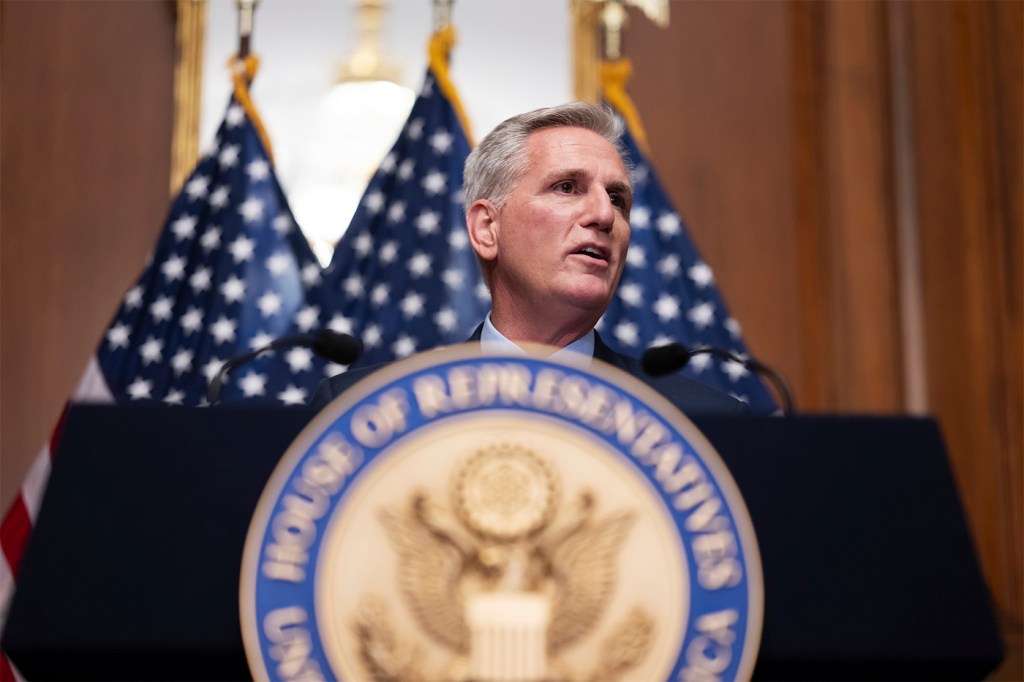Who will be the next speaker of the House after Kevin McCarthy? How long does the process take?

Far-right Republicans claimed victory in ousting Kevin McCarthy as speaker of the House of Representatives.
“It’s the benefit of this country that we have a better speaker of the House than Kevin McCarthy,” Rep. Matt Gaetz of Florida, who led the effort to topple McCarthy, told reporters after the vote. “We should elect a speaker who’s better.”
But a policy expert at Northeastern University said the Republican Party as a whole — and particularly its leader and likely presidential nominee, former President Donald J. Trump — may have just shot themselves in the foot.
“This is not likely to help the Republican Party with the national perception that the party is dysfunctional and chaotic,” said Costas Panagopoulos, Distinguished Professor of Political Science at Northeastern University. “And it’s not going to help Donald Trump, who is perceived by many people to be the main source of political chaos at the moment.”
Eight far-right Republicans joined with all Democrats in the House on Tuesday in voting to remove McCarthy as House speaker. It was the first time in history that the chamber had removed a speaker from the post involuntarily.
“I think what happened may be unprecedented, but it shouldn’t be viewed as too surprising, given the kinds of concessions McCarthy made to hardliners to become speaker in the first place,” Panagopoulos said. “Agreements that are made, for whatever reason, with extremists can end up backfiring.”
And Gaetz, who has strongly aligned himself with Trump, may have some explaining to do.
Gaetz suggested — albeit with lots of wiggle room — that he had Trump’s backing.
“My conversations with the former president leave me with great confidence that I did the right thing,” he said after the vote, according to NBC News.
But Trump’s only public comment came on Tuesday on Truth Social, the social media platform he owns.
“Why is it that Republicans are always fighting among themselves, why aren’t they fighting the Radical Left Democrats who are destroying our country,” Trump wrote.
Moreover, NBC reported that multiple Trump allies and supporters “refused to weigh in on (Gaetz’s) side.”
Panagopoulos said that Trump will likely nevertheless be tied to the ouster and the resulting uncertainty in the House.
“Trump has stoked this kind of chaos for many years in the country and, for better or worse, he is identified with it, especially when the source is on the Republican side of the aisle,” Panagopoulos said. “Whether true or not, he will have to take some responsibility for what is happening now or try to defend it in some ways.”
That may not play well beyond Trump’s base. Especially with Republicans stinging from recent election losses and disappointments.
“One could make the case that Trump cost Republicans a comfortable enough margin in the House in 2022 to avoid situations like this,” Panagopoulos said. “When you remind voters that Trump was a drag on the party in 2022, you also remind them that Trump lost the 2020 presidential election and that he helped cause Republicans to do poorly in 2018 and many other elections since then. That has the potential to have a cumulative effect on voters to view Trump as an electoral liability rather than an asset.”
“It could hurt Trump going forward,” Panagopoulos continued. “Not with his ideological base perhaps, but with the broader Republican electorate that wants to move the party forward without shooting themselves in the foot.”
This might further the division within the party, particularly if McCarthy — another Trump ally — begins to criticize the former president.
“”It’s also fair to point out — as many have — that the recent GOP spat wasn’t really about ideology or policy; it was an example of chaos for the sake of chaos,” Panagopoulos said. “And who embodies that or exemplifies political chaos more than Donald Trump at this point in the country right now?”
“Voters value stability. The economy values stability. Chaos might rile up the base that’s disillusioned about some things in politics, but it doesn’t necessarily serve the best interests of the country as a whole,” Panagopoulos continued. “And when you have the chaos of Republicans juxtaposed with the relative stability of the Democratic Party right now, it’s a real contrast, and voters have to ask themselves what side are they on.”
So, what happens next?
Jeremy R. Paul, a professor of law and former dean of the Northeastern University School of Law, says the Republican leadership will meet this week and allow members of the party who wish to run for the speakership to submit their bids. Then the caucus will cast private votes on who they think is the strongest candidate.
“Then they have to bring the full House back together,” Paul says. “The interesting thing to ponder is whether there is anyone among the Republicans they look at who will be able to attract Democratic votes.”
The name that has been floated is House Majority Leader Steve Scalise, a Louisiana Republican who Gaetz appeared to endorse in an interview with reporters on Tuesday. Scalise is up for reelection in November 2024.
If the House is able to successfully install another speaker in the coming days, it’s unclear how long that person will last given the bitter divide within the Republican Party.
Indeed, it’s Republican factionalism that was the problem from the beginning, Paul says.
“[McCarthy] agreed to change House rules to raise a motion to vacate,” Paul says. “All it takes is four or five people to be angry with the speaker, and they can kick him out. It was a bad rule to begin with.”
Cyrus Moulton is a Northeastern Global News reporter. Email him at c.moulton@northeastern.edu. Follow him on Twitter @MoultonCyrus.
Tanner Stening is a Northeastern Global News reporter. Email him at t.stening@northeastern.edu. Follow him on Twitter @tstening90.







